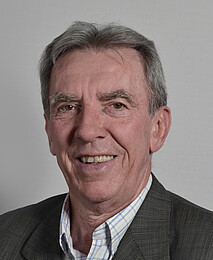Publication date: 05/10/16
ThemesNews
Jean-Pierre Sauvage, emeritus professor of the University of Strasbourg and member of the Académie des Science has been awarded today, 5 October, the Nobel Prize for Chemistry 2016. He shares this Prize with the Scot James Fraser Stoddart (Northwestern University) and the Dutch Bernard Feringa (Rijksuniversiteit Groningen).
“We proudly received these great news. The honour we share with the CNRS will have a positive effect on our whole site”, expressed Michel Deneken, interim president of the University of Strasbourg. This distinction rewards the pioneer work on the design and synthesis of molecular machines. These compilations of tiny scale are capable to actuate movement in a controlled manner as response to diverse signals as UV light.
Nature provides numerous protein machines that researchers try to decipher. As in a contracting muscle, they intervene in many biological processes. Kinesin is, for example, is a protein capable of transporting molecules in a cell. ATPase is a protein machine that produces our energy resource, ATP.
Imitate nature
Inspired by this, Jean-Pierre Sauvage dedicated his career to the synthesis of molecules that act like machines. The challenge in this process: to succeed in switching on and controlling the machine by means of (physical, chemical, electronic) signals in order to change the equilibrium of force between the atoms. Oscillating rotating systems, molecule “shuttles” or artificial muscles on nano scale are some of these synthetic dynamic systems that the researcher developed. “This Nobel prize honours first the researcher’s talent, but also the excellence research in the field of chemistry done at the University of Strasbourg”, underlines Michel Deneken. “In 1987, Jean-Marie Lehn paved this way, in 2013 followed Martin Karplus, whereas in 2011, Jules Hoffmann was awarded the Nobel Prize in Physiology or Medicine.”
Promising molecular machines
These tiny machines have a promising future ahead. Numerous applications will be considered: targeted transport of medicaments, the conception of deformable materials, the storing of information in “molecular computers” or a light-operated molecular switch. “The entire university community congratulates Jean-Pierre Sauvage and I say BRAVO!” applauds Michel Deneken.
















